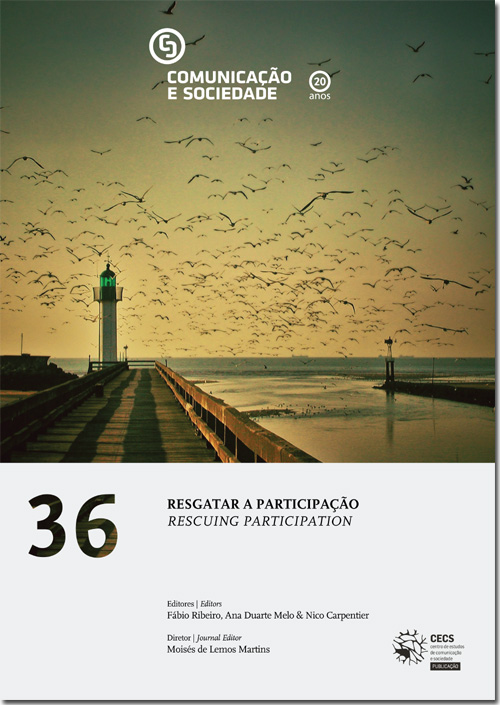Participation and intangible cultural heritage: a case study of “Tava, place of reference for the Guarani people”
DOI:
https://doi.org/10.17231/comsoc.36(2019).2349Keywords:
Brazil, dialogical heritage, Guarani, intangible cultural heritage, participationAbstract
The category of intangible cultural heritage (ICH), recently institutionalized by several countries (2000, in the case of Brazil) and, internationally, by Unesco (2003), requires the participation of groups and communities in the identification, safeguarding and maintenance of their heritage. Due to the recent nature of these policies, there is still only a small number of studies examining the levels and strategies of participation used in determining ICH. More recently, Rodney Harrison (2013) argued that is important to study not only the participation of humans in heritage processes, but also, especially in indigenous contexts, the participation of nonhumans. In order to contribute to these discussions, the article describes and analyzes the patrimonialization of the ruins of the São Miguel Jesuit-Guarani Missions, located in the Brazilian state of Rio Grande do Sul, as “Tava, Place of Reference for the Guarani People”. The process lasted a decade and initially encountered some resistance from the Guarani. However, the establishment of reciprocity and affinity relations between indigenous and non-indigenous agents, the recognition of ICH’s political potential and the influence of spiritual aspects, including nonhumans, promoted the participation of the Guarani, who proved to be essential actors for the identification and registration of the cultural landmark in 2014.
Downloads
References
Ashworth, G. J. & Turnbridge, J. (1996). Dissonant heritage: the management of the past as a resource in conflict. Chichester: Wiley.
Ashworth, G. J., Graham, B. & Turnbridge, J. (2007). Pluralising pasts: heritage, identity and place in multicultural societies. Londres: Pluto Press.
Batista, J. (2015). Dossiê Missões: as ruínas. Brasília: IBRAM.
Blake, J. (2009). Unesco’s 2003 Convention on intangible cultural heritage: the implications of community involvement in “safeguarding”. In L. Smith & N. Akagawa (Eds.), Intangible heritage (pp. 45-73). Londres/Nova Iorque: Routledge.
Bortolotto, C. (2014). La problemática del patrimonio cultural inmaterial. Culturas. Revista de Gestión Cultural, 1(1), 1-22. https://doi.org/10.4995/cs.2014.3162
Carvalho, A., Carvalho, E. I. de & Carelli, V. (2011). Vídeo nas aldeias: 25 Anos. Olinda: Vídeo nas Aldeias.
Casanova, P. G. (1965). Internal colonialism and national development. Studies in Comparative International Development, 1(4), 27-37.
Castro, E. V de. (2002a). A inconstância da alma selvagem e outros ensaios de Antropologia. São Paulo: Cosac Naify.
Castro, E. V. de. (2002b). O nativo relativo. Mana, 8(1), 113-48.
Clastres, P. (1974/2013). A sociedade contra o Estado: pesquisas de antropologia política. São Paulo: Cosac Naify.
Cooke, B. & Kothari, U. (2002). Participation: the new tyranny? Londres/Nova Iorque: Zed Books.
Cunha, M. C. da. (2008). “Culture” and culture. Traditional knowledge and intelectual rights. Cambridge: Prickly Paradigm Press.
Ganson, B. (2003). The Guaraní under Spanish rule in the Río de la Plata. Stanford: Stanford University Press.
Handler, R. (1988). Nationalism and the politics of culture in Quebec. Madison: The Wisconsin University Press.
Harrison, R. (2013). Heritage: critical approaches. Oxon/Nova Iorque: Routledge.
Herzfeld, M. (1991). A place in history: social and monumental time in a Cretan town. Princeton: Princeton University Press.
INRC – Inventário Nacional de Referências Culturais (2006). Relatório da etapa de identificação sítio comunidade Mbyá-Guarani São Miguel Arcanjo. Porto Alegre: IPHAN/RS & NIT/UFRGS.
IPHAN (2014). Ata da 77ª Reunião do Conselho Consultivo do Patrimônio Cultural – Brasília – 03 e 04 de Dezembro de 2014. Retirado de http://portal.iphan.gov.br/uploads/atas/ATA__77_Reuniao_Conselho_Consultivo__03_e_04122014.pdf
Lacerda, R. (2018a). O plano, o contraplano e o “plano sem plano”: imagens ocidentais e os Mbya Guarani das Ruínas de São Miguel. Iluminuras, 19(46), 135-168. https://doi.org/10.22456/1984-1191.85245
Lacerda, R. (2018b). The collaborative indigenous cinema of Vídeo na Aldeias and the intangible cultural heritage. MEMORIAMEDIA, 3, 1-11.
Ladeira, M. I. (1992/2007). O caminhar sob a luz: território Mbya à beira do oceano. São Paulo: Editora UNESP.
Milne, E-J. (2012). Saying “no” to participatory video: unraveling the complexities of (non) participation. In E-J Milne, C. Mitchell & N. de Lange (Eds.), Handbook of participatory video (pp. 257-268). Plymouth: Altamira Press.
Moraes, C. E. N. (2010). A refiguração da Tava Miri São Miguel na memória coletiva dos Mbyá-Guarani nas Missões/RS, Brasil. Tese de doutoramento, Universidade Federal de Rio Grande do Sul, Porto Alegre, Brasil.
Morinico, J. R., Beñites, G., Ortega, A. (Realizadores). (2008). Mokoi Tekoá Petei Jeguatá, Duas aldeias, uma caminhada [Filme]. Brasil: Vídeo nas Aldeias.
Noyes, D. (2006). The judgment of Solomon: global protections for tradition and the problem of community ownership. Cultural Analysis, 5, 27-56.
Ortega, A., Ferreira, P. (Realizadores). (2011). Bicicletas de Nhanderu [Filme]. Brasil: Vídeo nas Aldeias.
Ortega, A., Ferreira, P., Carvalho, E. I., Carelli, V. (Realizadores). (2012). Tava, a casa de pedra [Filme]. Brasil: Vídeo nas Aldeias.
Pierri, D. (2018). O perecível e o imperecível: reflexões Guarani Mbya sobre a existência. São Paulo: Elefante.
Pires, D. de M. (2007). Alegorias etnográficas do Mbya rekó em cenários interétnicos no Rio Grande do Sul (2003-2007): discurso, prática e holismo Mbyá frente às políticas públicas diferenciadas. Dissertação de mestrado, Universidade Federal de Rio Grande do Sul, Porto Alegre, Brasil.
Pissolato, E. (2007). A duração da pessoa: mobilidade, parentesco e xamanismo Mbya (Guarani). São Paulo: Editora da UNESP.
Quijano, A. (2010). Coloniality and modernity/rationality. In W. D. Mignolo & A. Escobar (Eds.), Globalization and the decolonial option (pp. 22-32). Oxon/Nova Iorque: Routledge.
Rose, D. (2011). Wild dog dreaming: love and extinction. Charlottesville/Londres: University of Virginia Press.
Schaden, E. (1974). Aspectos fundamentais da cultura Guarani. São Paulo: Editora da Universidade USP.
Smith, L. (2006). Uses of heritage. Oxon: Routledge.
Souza, J. O. C. (1998). Aos fantasmas das Brenhas: etnografia, invisibilidade e etnicidade de alteridades originárias no sul do Brasil. Tese de doutoramento, Universidade Federal de Rio Grande do Sul, Porto Alegre, Brasil.
Downloads
Published
How to Cite
Issue
Section
License
Authors own the copyright, providing the journal with the right of first publication. The work is licensed under a Creative Commons Attribution 4.0 International License.











